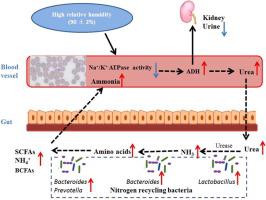Journal of Advanced Research ( IF 11.4 ) Pub Date : 2021-03-15 , DOI: 10.1016/j.jare.2021.03.004 Hongmei Yin 1 , Yadong Zhong 1 , Hui Wang 1 , Jielun Hu 1 , Shengkun Xia 1 , Yuandong Xiao 2 , Shaoping Nie 1 , Mingyong Xie 1, 3

|
Introduction
Colonic urea-nitrogen metabolites have been implicated in the pathogenesis of certain diseases which can be affected by environmental factors.
Objectives
We aimed to explore the influence of ambient humidity on colonic urea-nitrogen metabolism.
Methods
Blood biochemical indexes, metabolites of intestinal tract, and gut microbiota composition of mice (n = 10/group) exposed to high relative humidity (RH, 90 ± 2%) were analyzed during the 14-day exposure.
Results
After 12-h exposure, plasma blood urea nitrogen (BUN) level increased along with a decrease in the activity of erythrocyte Na+/K+ -ATPase. Moreover, abnormal erythrocyte morphologies appeared after 3 days of exposure. The colonic BUN and ammonia levels increased significantly after the 12-h and 24-h exposure, respectively. The colonic level of amino acids, partly synthesized by gut microbiota using ammonia as the nitrogen source, was significantly higher on the 7th day. Furthermore, the level of fecal short-chain fatty acids was significantly higher after 3-day exposure and the level of branched-chain fatty acids increased on the 14th day. Overall, gut microbiota composition was continuously altered during exposure, facilitating the preferential proliferation of urea-nitrogen metabolism bacteria.
Conclusion
Our findings suggest that short-term high RH exposure influences colonic urea-nitrogen metabolism by increasing the influx of colonic urea and altering gut microbiota, which might further impact the host health outcomes.
中文翻译:

短期暴露于高相对湿度会增加血尿素,并通过改变肠道微生物群影响结肠尿素氮代谢
介绍
结肠尿素氮代谢物与受环境因素影响的某些疾病的发病机制有关。
目标
我们旨在探索环境湿度对结肠尿素氮代谢的影响。
方法
对暴露于高相对湿度(RH,90 ± 2%)的小鼠( n = 10/组)在暴露 14 天期间的血液生化指标、肠道代谢物和肠道微生物群组成进行分析。
结果
暴露12小时后,血浆尿素氮(BUN)水平升高,红细胞Na + /K +活性降低-ATP酶。此外,暴露3天后出现异常红细胞形态。在暴露 12 小时和 24 小时后,结肠 BUN 和氨水平分别显着增加。肠道菌群以氨为氮源合成的部分氨基酸的结肠水平在第 7 天显着升高。此外,暴露3天后粪便短链脂肪酸水平显着升高,第14天支链脂肪酸水平升高。总体而言,肠道微生物群组成在暴露过程中不断改变,促进了尿素氮代谢细菌的优先增殖。
结论
我们的研究结果表明,短期高 RH 暴露通过增加结肠尿素的流入和改变肠道微生物群来影响结肠尿素氮代谢,这可能会进一步影响宿主的健康结果。











































 京公网安备 11010802027423号
京公网安备 11010802027423号